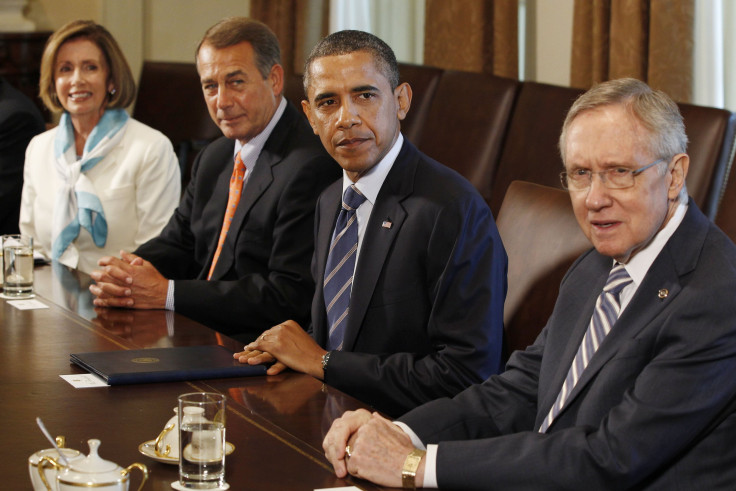Sequester Cuts 2013: What Choices Does Obama Have?

The 2013 sequester cuts will take effect today if President Barack Obama and congressional leaders cannot broker a compromise that would offset them.
Lawmakers literally have hours to come up with an agreement as the president is expected to issue a sequestration order sometime today before midnight. Approximately $85 billion in automatic, across-the-board spending cuts will be split evenly between defense and domestic programs, and there is still uncertainty surrounding the reality and the immediacy of the impacts.
Obama will hold a last-minute meeting on the sequester at 10:05 a.m. in the Oval Office with House Speaker John Boehner, R-Ohio, Senate Majority Leader Harry Reid, D-Nev., House Minority Leader Nancy Pelosi, D-Calif., and Senate Minority Leader Mitch McConnell, R-Ky. It is the first time that such a meeting will occur, as both sides have been playing the blame game for weeks.
But nothing is expected to come from this meeting. Democrats and Republicans are at a gridlock, because they have different proposals on how to solve the latest manufactured fiscal crisis.
On one hand, Democrats have called for a mixture of new tax revenues and spending cuts -- about $110 billion worth -- to put off the sequester for the rest of the year. This would include a 30 percent tax on millionaires and closing tax loopholes. That plan failed to pass in the Senate yesterday, when it was shot down 51 to 49.
On the other, a sequester alternative from Republicans, who said Obama has already gotten his sought after tax increase when the fiscal cliff was resolved in January, fell even shorter of the 60 votes needed yesterday, with the finally tally 38 to 62. That measure would have kept the spending cuts in place but give Obama the flexibility on how to implement them.
John Hart, the communications director for Sen. Tom Coburn, R-Okla., said he doesn’t think there will be deal struck in today’s meeting.
“No,” he said. “The Obama administration’s refusal to fix Medicare will continue to put budget pressure on things like education and defense.”
According to Hart, if sequestration isn’t averted, then the public will “see the administration demonstrating more flexibility than they say they have.”
Some say Republicans will be entering the meeting with the president not with an intention to fix the sequester but to lay the groundwork for how to fund the government for the rest of the year.
“The trigger is already pulled tomorrow,” Mackenzie Eaglen, resident fellow at American Enterprise Institute, said. “What can come of it?”
Eaglen specializes in defense strategy, budget, military readiness and the defense industrial base. She has worked on defense issues in the U.S. Congress for both the House and Senate and also at the Pentagon in the Office of the Secretary of Defense and on the Joint Staff.
As it appears now, lawmakers are more than willing to let the 2013 defense spending cuts and the slashes to the budget for domestic programs happen. When and if the sequestration order is signed by Obama at some point today, the Office of Management and Budget, or OMB, estimates that there will be a 9 percent reduction for nondefense programs and 13 percent reduction for defense programs.
However, though there have been calls from various lawmakers and governors to leaders in Congress to avert these cuts or implement them better, today seems more of a soft deadline. The March 27 continuing resolution deadline is approaching, and lawmakers could take that more seriously because it deals with appropriations to the government, avoiding a shutdown.
“There is no detailed budget for the federal government and so the guidance on how to execute budget cutting from no budget puts the White House in the driver’s seat for determining how to execute the sequester,” Eaglen said.
According to her, the White House has two options at this point: Make the decision to implement the sequester in the harshest, quickest way possible so that it “inflicts pain on the American people to pressure members of Congress to cut a deal,” or decide that government agencies “have the maximum flexibility to decide what lower priorities can be shed and what essential, higher priority missions can be implemented.
“The White House can unilaterally determine that guidance if they wanted to,” she said.
The White House has already instructed that military personnel paychecks and the Department of Veterans Affairs, for example, are exempt from sequester.
“Congress didn’t stop him or pass legislation to express their discontent [for that guidance],” Eaglan said. “Ultimately, this is going to be a political decision. I don’t know which one he will decide. It would be naïve to think politics would not play a role in that decision.”
More than 750,000 people could lose their jobs if sequestration goes through and is not stopped in a few days. Everything from education to food safety and health research will be affected.
But with all these effects set to happen as the various agencies gradually implement the sequester, the possibility of a compromise still looks elusive. Republicans are refusing a bargain that includes taxes. And Democrats remain adamant the inclusion of taxes is a part of the “balanced approach” the president wants to see. Therefore, a compromise between Congress and Obama is the least likely option but remains possible given the current climate of uncertainty in American politics.
© Copyright IBTimes 2024. All rights reserved.






















